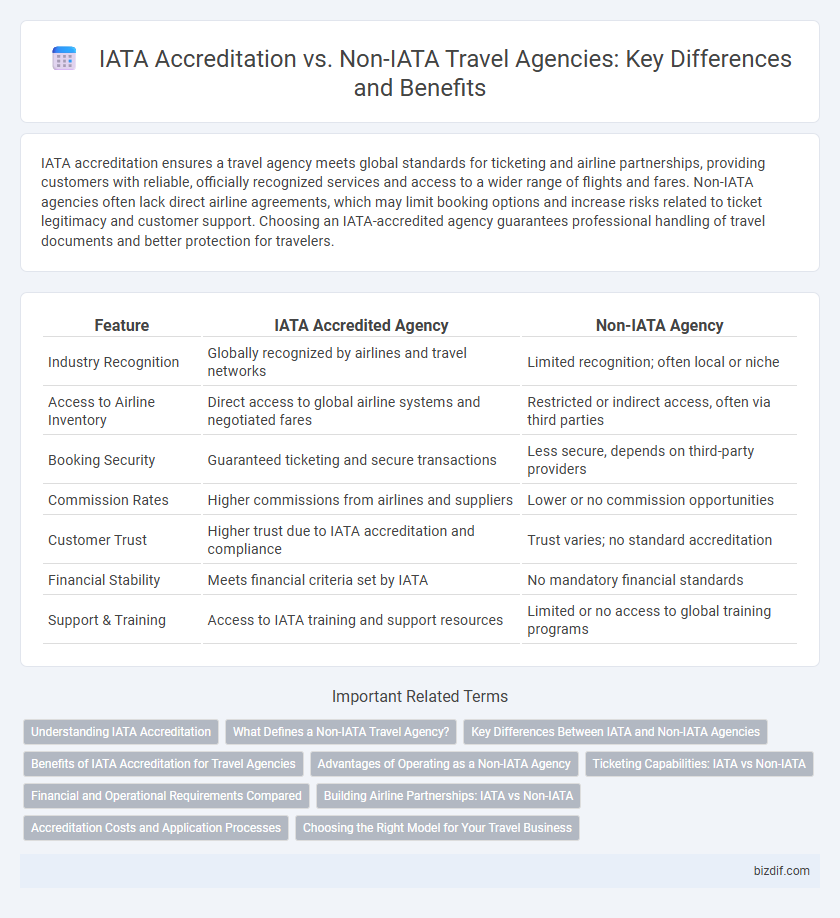IATA accreditation ensures a travel agency meets global standards for ticketing and airline partnerships, providing customers with reliable, officially recognized services and access to a wider range of flights and fares. Non-IATA agencies often lack direct airline agreements, which may limit booking options and increase risks related to ticket legitimacy and customer support. Choosing an IATA-accredited agency guarantees professional handling of travel documents and better protection for travelers.
Table of Comparison
| Feature | IATA Accredited Agency | Non-IATA Agency |
|---|---|---|
| Industry Recognition | Globally recognized by airlines and travel networks | Limited recognition; often local or niche |
| Access to Airline Inventory | Direct access to global airline systems and negotiated fares | Restricted or indirect access, often via third parties |
| Booking Security | Guaranteed ticketing and secure transactions | Less secure, depends on third-party providers |
| Commission Rates | Higher commissions from airlines and suppliers | Lower or no commission opportunities |
| Customer Trust | Higher trust due to IATA accreditation and compliance | Trust varies; no standard accreditation |
| Financial Stability | Meets financial criteria set by IATA | No mandatory financial standards |
| Support & Training | Access to IATA training and support resources | Limited or no access to global training programs |
Understanding IATA Accreditation
IATA accreditation is a certification that enables travel agencies to issue airline tickets directly, ensuring access to global distribution systems and negotiated industry rates. Non-IATA agencies lack this accreditation, which often requires partnerships with IATA agents to fulfill ticketing and booking needs. Understanding IATA accreditation helps travel agencies enhance credibility, streamline booking processes, and access exclusive airline agreements.
What Defines a Non-IATA Travel Agency?
A Non-IATA travel agency operates without accreditation from the International Air Transport Association, which means it cannot issue airline tickets directly and must rely on IATA-licensed agents or consolidators for ticketing. These agencies often specialize in niche markets, customized travel experiences, or act as intermediaries providing travel planning and package services. Despite lacking IATA accreditation, Non-IATA agencies can offer competitive pricing and personalized services by leveraging partnerships and technological platforms.
Key Differences Between IATA and Non-IATA Agencies
IATA-accredited travel agencies have direct access to global airline reservation systems, enabling them to issue official airline tickets and offer competitive pricing through negotiated agreements. Non-IATA agencies lack this accreditation and must rely on third-party consolidators for ticketing, often resulting in limited service options and higher costs. IATA accreditation also assures adherence to standardized operational and financial regulations, enhancing reliability and customer trust compared to non-IATA agencies.
Benefits of IATA Accreditation for Travel Agencies
IATA accreditation provides travel agencies with global recognition, enabling access to a vast network of airlines and exclusive booking systems that increase operational efficiency and credibility. Accredited agencies benefit from financial security guarantees, streamlined payment processes through the Billing and Settlement Plan (BSP), and enhanced travel industry partnerships. These advantages often result in competitive pricing, better client trust, and expanded service offerings compared to non-IATA agencies.
Advantages of Operating as a Non-IATA Agency
Operating as a Non-IATA agency offers greater flexibility in partnering with diverse travel suppliers without stringent compliance requirements, enabling faster adaptation to market changes. Non-IATA agencies avoid high accreditation fees, lowering operational costs and increasing profitability potential. This model also encourages innovative service offerings and direct agreements with airlines, which can result in exclusive deals and personalized customer experiences.
Ticketing Capabilities: IATA vs Non-IATA
IATA-accredited agencies have direct access to global airline reservation systems, enabling seamless ticket issuance and real-time fare updates, which enhances booking accuracy and customer service efficiency. Non-IATA agencies typically rely on third-party consolidators or intermediaries for ticketing, resulting in limited access to airline inventory and potential delays in ticket delivery. The direct ticketing capabilities of IATA agencies offer greater reliability and speed, making them preferred by travelers seeking comprehensive flight options and assured ticket validity.
Financial and Operational Requirements Compared
IATA-accredited travel agencies must meet strict financial stability criteria, including maintaining a secure bond and proving sufficient net worth, ensuring reliable payment processing and supplier trust. Non-IATA agencies are not bound by these financial safeguards, which may impact their creditworthiness and ability to access official airline fares or global distribution systems. Operationally, IATA agencies undergo rigorous audits and adhere to global standards, providing enhanced credibility and streamlined booking capabilities compared to non-IATA counterparts.
Building Airline Partnerships: IATA vs Non-IATA
IATA-accredited travel agencies have direct access to global airline partnerships, enabling them to issue official tickets and negotiate exclusive fares and commissions with airlines. Non-IATA agencies often rely on third-party consolidators or global distribution systems, limiting their ability to form direct airline collaborations and restrict access to certain airline inventory. Airlines prefer IATA agencies for streamlined transactions and trusted compliance, making building strong airline partnerships more efficient and beneficial for IATA-accredited agencies.
Accreditation Costs and Application Processes
IATA accreditation requires payment of fees ranging from $1,500 to $6,000, depending on the country and size of the agency, while non-IATA agencies avoid these costs but miss out on global ticketing privileges. The application process for IATA includes submitting financial documents, proof of business registration, and completing a detailed accreditation form, which can take several weeks. Non-IATA agencies typically undergo a simpler registration process with fewer requirements, allowing faster entry into the travel market but limiting access to certain airline partnerships.
Choosing the Right Model for Your Travel Business
IATA accreditation offers travel agencies global recognition, streamlined access to airline inventory, and enhanced credibility, essential for businesses aiming to book directly with airlines and offer competitive fares. Non-IATA agencies benefit from lower startup costs and greater flexibility but rely on intermediaries, which may limit direct booking capabilities and affect profit margins. Selecting the right model depends on your travel business goals, budget, and the need for direct airline relationships versus operational agility.
IATA accreditation vs Non-IATA agency Infographic

 bizdif.com
bizdif.com